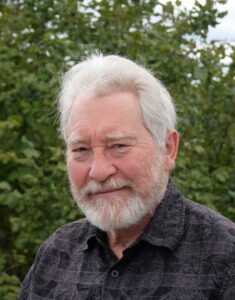Ecstatic vessels
In Your Nature
by Estlin McPhee
Kingston: Brick Books, 2025
$23.95 / 9781771316439
Reviewed by Harold Rhenisch
*

This is a book of transmutations and fairy tales reframing Christian culture as fairy tale. Like all fairy tales, it walks through a tragic thicket between how things should be and how they are.
This thicket includes trans people and the hag Befana, who accompanies the Three Magi to Bethlehem to find their new king. She chooses to follow them on her broomstick, but the tech is so slow that she’s still flying around the world today, leaving, west coast writer Estlin McPhee (Shapeshifters) writes in “Glossolalia,” presents in the hope that “one of them is the child whom she seeks.”
This tapestry of social bodies is not the claim of a planet on human physical and community life. It’s not a collection of tattoos pricked into skin to mark cultural belonging or aspiration. It is a stream of graphic novels, pop-up books, make-your-own-adventures, fairy tales, Christian bedtime prayers, kids’ illustrated books, television, movies, werewolf stories, and the Internet.
McPhee’s trans people are children isolated by body image rules. The poems consistently search for a third space, not in the patterns male/female/neither or male/female/both, but as pattern male/female/self. Bodies here are inhabited by the process of imagining themselves outside the strictures of binary human form. Words, too.
The escape is not always complete. When, in “Boy,” Mcphee writes, “Boyhood/shaped you into a closed book/and me into open scaffolding,” a binary judgement remains. The self assessment, though, is strong: a self that is a scaffolding, not a destination. That’s beautifully said.

Still, binaries haunt these words even by their absence. “Lycanthropy,” for example, ends with, “A boy is waiting/by the edge of the woods/for whatever comes next.” What comes is literally silence and white space. The film (reality in this country) is over. There’s space for humans now, but it’s private. Their bodies, their public show, hides their selves.
This messing around with the fourth wall of poetry is a technique of graphic novels, urban myths, romantic comedies, and spoken word performances. In them all, the intimacy of conversation is the real content. These are also poems, though, on pages. In such embodied form, selves are absent, too, no matter how strong the longing for them.
That can be positive. In “Prayer for What’s to Come,” for example, McPhee contextualizes childhood Christian roots to speak of the rituals within supposed “reality.” Instead of church homily and self-alignment to rigid norms, the body itself is the lesson:
At church
we learn what the mouth is capable of,
how a sound can round a body
into an ecstatic vessel.
It’s a fine description of the process of the book as a whole. When McPhee uses this ecstasy to challenge a paternal God, albeit with some bitterness—
There is nothing torn asunder
that God can’t put right.
Maybe one day you will make us
into such magicians.
The ending is flat—not because the thought has no conviction or that a pop culture magician cannot be ecstatic, but because the necessary nuance of “such” to bless the “magicians” with power falls outside the stress of the line. Like a song lyric, it needs to be performed to live.
The book argues that when you are a boy in a body that doesn’t fit (or vice versa), media images are the only thing that reflects the self. In McPhee’s world, this is freedom, not as an open-ended concept, but as freedom-from. I like that.
A contrasting openness appears mainly when the sea is present. “After work,” writes Mcphee in “Young Hearts Run Free,” “I drop my body into the ocean,/let something larger than myself hold me up.” McPhee expands the water image by envisaging Jesus as equally drowned, in “Martha and Mary Witness Jesus’ Death Across Time and Space: Bridge”:
And my sister
staring at where the man was a moment ago,
current lapping over her toes, as though
there is something there only she can see.
On one hand, the two see the same thing individually. On the other hand, the thing seen differently is the same thing. The transformative self that unites the two is a riddle to them.
The point of a riddle is that it can be solved. It can become a word. McPhee’s riddles point outwards to worldlessness. As an example of this pop take, Jesus is viewed as a magus. As such, in “Gay Messiah,” he “brings out a cauldron,/travel-size.” This is not the divine man Jesus. It’s not a working Wiccan practitioner bringing out tools and amulets. It’s pure comic book, illustrating that “he” always was a pop star, and that culture is continuous across trans-binary conversations.
It remains a riddle, too. In “Harmless,” McPhee questions if it’s important whether a werewolf is made up or real, then transfers the question to the poem: “If I was making myself up,/so what?” Is the riddle a devouring beast? Who knows. The riddle is unanswerable. In traditional Wicca, signs impact a physical world. Within In Your Nature, they work with the imaginary only.
The flip side of this life within is that the Earth doesn’t have power here. As McPhee documents, in “In 2006 Everyone is Trans,” teenagers “trudge/weekly to the auditorium/where we watch TransGeneration/projected and compare ourselves/to the real people on the screen.”
This process of comparison works well when its obsessions are self-aware. Here’s an example, from “Keep Our Bodies”:
I don’t want us to be the ones to gather
ourselves into our own arms and tell ourselves we’re beautiful.
Won’t someone else do that?
The word “beautiful” is cleverly avoided and stronger for its absence.
Such ironies are often powered by metaphor. In “Affirmations,” the over-the-top cinema and graphic novel image “I brandish the love I have for you like a flame/that singes everything I touch,” is only barely rescued from sentimentality by the break between the likeness of metaphor and the reality of its effects in a metaphoric world. It’s not “really” flame; it’s “like” flame.
That’s spell craft. Magic is transformative. It turns one thing into another, often to change understandings or to cause a mind to see a different physical world and make it so. This transformation can be enacted through signs such as “stone,” “sun,” “salt,” “water,” and “fire,” assigned to physical states of energy which react physically on each other. A parallel transformation is enacted through pop cultural witches and cauldrons turning a land of Christian fear and control to negate it into riddles of identity.
All true riddles transfer a secret into an openness. “Ah,” we say when the answer comes, our mouths completely open. McPhee’s riddles are more such mouths than the words they speak. Consider “Prayer for our Past Selves”—
I’m trying to find a way to tell
those kids that they won’t become
who they think they will —
people more extraordinary than us.
They’ll simply carry on being themselves.
The book’s preference for making unions through metaphor’s effects allows a unicorn and a church to become one through imagery and allows for third dimensions, such as—in “Genesis”—“The witch created the werewolf—/who created the witch?”
It’s pure performance. Asking a live audience to celebrate a riddle like that, one that does not resolve except in that audience, works. Asking a reader alone with a printed poem the same calls up this answer instead: A character called “who” (or “who-ness”) created the witch.
The othering in that speaks of long hurt. In that context, the question “Are you a boy or a girl?” posed in “Transvection of a New Kind,” is a threat. It is what is not to be asked, because in the not-choice of being a self, it’s never a choice that can be made. One can’t settle on that one thing.
In “Human Nature” McPhee has an answer to that:
So what if sometimes we want
to be the kind of story someone else would tell.
and
I hope they get it right, that they remember
the details.
I hope so, too. Who will answer that?

*

Harold Rhenisch has written thirty-five books from the Southern Interior since 1974. He won the George Ryga Prize for a memoir, The Wolves at Evelyn. His other grasslands books are Tom Thompson’s Shack and Out of the Interior. He lived for fifteen years in the South Cariboo and worked closely with photographer Chris Harris on Spirit in the Grass, Motherstone, Cariboo Chilcotin Coast, and The Bowron Lakes; and he writes the blog Okanagan-Okanogan. Harold lives in an old Japanese orchard on unceded Syilx Territory above Canim Bay on Okanagan Lake. [Editor’s note: Harold Rhenisch has reviewed books by Al Rempel, Hari Alluri, Brian Day, Jason Emde, John Givins, DC Reid, Kim Trainor, Dallas Hunt, Tim Bowling, Hamish Ballantyne, Zoë Landale, Kerry Gilbert, Robert Hilles, Sho Yamagushiku, Bradley Peters, Aaron Tucker, Dale Tracy, Dominique Bernier-Cormier, Selina Boan, Joseph Dandurand, Délani Valin, Robert Bringhurst, Rayya Liebich, Sarah de Leeuw, Roger Farr, Stephan Torre, Don Gayton, and Calvin White for BCR. Recently, his The Salmon Shanties was reviewed by Steven Ross Smith.]
*
The British Columbia Review
Interim Editors, 2023-26: Trevor Marc Hughes (non-fiction), Brett Josef Grubisic (fiction and poetry)
Publisher: Richard Mackie
Formerly The Ormsby Review, The British Columbia Review is an online book review and journal service for BC writers and readers. The Advisory Board now consists of Jean Barman, Wade Davis, Robin Fisher, Barry Gough, Hugh Johnston, Kathy Mezei, Patricia Roy, and Graeme Wynn. Provincial Government Patron (since September 2018): Creative BC. Honorary Patron: Yosef Wosk. Scholarly Patron: SFU Graduate Liberal Studies. The British Columbia Review was founded in 2016 by Richard Mackie and Alan Twigg.
“Only connect.” – E.M. Forster